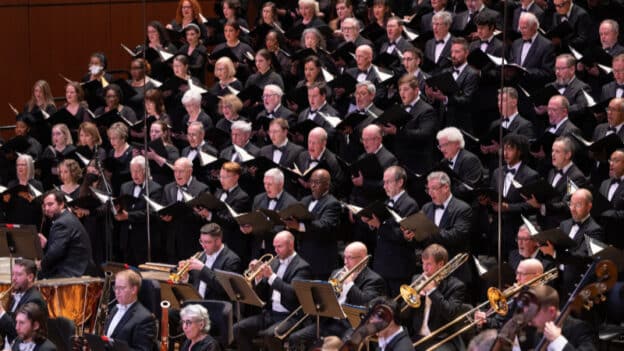College stops marking music students ‘to protect their mental health’
mainThe Royal Welsh College of Music and Drama has stopped giving marks to first-year students in ‘a pilot scheme’ aimed at helping their mental well-being.
Here’s the rationale: ‘Across the higher education sector overall, and within performing arts in particular, mental health issues are well documented. Students have got enough challenges when they come to us with regard to adapting to the training model and working out where they fit within the college, so let’s not also the put them in a position where they are comparing themselves to each other. That can’t be healthy.’
Why not give them all degrees on arrival and send them happily back home?






I have some sympathy for this approach but how does this help prepare them for a profession that is highly competitive?
Indeed – how does it prepare them for anything?
It’s a pretty widely-held view throughout academia that marking students in the first year in pretty much useless. Good for them.
I wouldn’t trust any widely held academic views any further than I could throw a Steinway. Those just don’t hold up anywhere outside of the land of the consitutionally oblique, aka Cloud-Cuckoo-Land.
Er…it is not a “widely held view” at all, please don’t make things up. Students need effective (and timely) feedback on what they are doing well and what they are doing poorly if they are to improve. This is how they learn. The mark is an extremely useful overall summary of the student’s feedback, and is extremely helpful in giving the student a clear understanding of how they are doing.
GSMD has a similar policy for Acting students (but not Music students) in all years, the rationale being that the quantitative feedback of a mark was not viewed as particularly helpful or relevant to their development and improvement. Of course, such a policy works well in a context where:
*admission to the Acting programme at GSMD is so competitive and so prestigious that merely being on it is enough of an achievement to guarantee being taken seriously by the profession;
*the profession recruits primarily by means of audition, rather than on the basis of academic qualifications;
*the course is heavily reliant on team-work (to a far greater extent than a Music course);
*there is plenty of opportunity to get detailed and individual *qualitative* feedback from a range of tutors and academic staff, many of whom are leaders in the profession.
It should be stressed that the students still receive quantitative marks, and these data can be obtained on request from the Registry, and, judging by the article, it seems that this will also be the case at the Royal Welsh. So, it is certainly not a case of conferring “degrees on arrival”.
Having said that, I doubt such a policy could ever work for Music students (except maybe for singers on a practical opera course where the main purpose is to get production experience rather than degrees), given the far more individualistic nature of the discipline, and the natural and reasonable desire to know where one stands in relation to others. Indeed, being “in the dark” about where one stands can be distressing in itself (so I do not think “mental health” is a good rationale), and I do feel strongly that, whilst marks are not an end in themselves, they are an important vehicle for accountability to the institutional and wider communities past, present, and future (the only UK institution to act accordingly is Cambridge, with its wonderful system of publishing class-lists at the Senate House — given the propensity in élite institutions for cliques and “circles within circles”, the openness of the class-lists was refreshing to me when I was an undergraduate there).
So, speaking personally, if I had been on a course with a non-disclosure policy, I would have gone to the Registry for my marks (albeit maybe not immediately), but I am a musician, not an actor.
“the only UK institution to act accordingly is Cambridge, with its wonderful system of publishing class-lists at the Senate House”
Isn’t that exactly the same as what happens at Oxford, where the results are published on noticeboards in the Examination Schools? I’m not sure what’s so wonderful about it though. Everyone gets their own results by post, so the only reason to go to the Exam Schools is to snoop on one’s friends, exes, etc., which they may or may not appreciate.
Alas, the other place discontinued class-lists about a decade ago.
As for your criticism of publishing marks, I do not think it “snooping” to want to know what marks were given to others (past and present). At Cambridge, the data published are the class achieved (first, upper-second, lower-second, third, ordinary, “declared to have deserved honours”, &c. — people who failed are not mentioned at all) by each candidate in each part of a Tripos, *not* the marks of individual examination papers. There is even a mechanism to opt-out of having one’s name published, if one does not want to appear on the class-lists at all.
Especially in an arts subject, marking is not on an absolute, objective scale. As such, the meaningfulness of the mark one receives is dependent in part on the context on how it relates to the marks of others. More generally, at an élite institution, there are often more candidates for admission capable of doing well than there are places available. In that context, I would argue that those who do take up a place have a responsibility to make something of the opportunities afforded to them by virtue of that place, and that it is reasonable for them to be held accountable for their performance by the institutional and wider communities (in élite competitions, whether in music or in sport, it is a given that the competitors’ names and rankings are public; of course, it may be distressing to do badly, but it is a vital life lesson to reconcile oneself publicly to one’s achievements, good and bad). In short, to suggest that academic marks were the private affair of the candidate in question would be to treat education as a commodity or a product.
The gods deliver us from “elite institutions.” Why is it that people who go to Oxbridge, Cornell and the Ivy League generally, can not keep quiet about it? Get your degree, move on and do something useful. Those places are more provincial than most universities, which have a penchant for thinking of themselves as the centers of all universes. I was educated at a large, private major university here in the States. After undergraduate and graduate school, I went to work (you remember work) and realize how much more I learned after my formal education. Now, I wouldn’t trade it for anything – although I think I would have picked a different school – but if you think a degree from fill-in-the-blank colleges guarantees you anything than the piece of paper, get over yourself. And I think one’s grades should be between College and Student.Period. It’s no one else’s business.
“The Royal Welsh College of Music and Drama has stopped giving marks to first-year students in ‘a pilot scheme’ aimed at helping their mental well-being.”
“Why not give them all degrees on arrival and send them happily back home?”
Agree! Ridiculous.
I assume that this college has a selective admissions policy and only admits the most highly motivated students. If that is the case, especially in the arts, grading does not make a lot of sense because their is really no objective standard as people are not taking the same tests or learning the same work.
When I was a college freshman I was so insecure that I was continually comparing myself to others, a fruitless exercise.
What would be very helpful to a first year student instead of grades would be extensive commentary and criticism, both positive and negative, and both verbal and written, from the instructor.
Absolutely right.
Apparently not receiving marks (or “grades” as we call them over here) for only your first year means never being held to any kind of standard, including admission or graduation.
Well, I checked. The scheme is for Acting and Design students only. So far it is for this year only but will be reviewed. Marks are available to those who want them but apparently the take up has been minimal. The aim is to “show students that the College is interested in them as a person, not as a ranking.” Look up RWCMD News to see the facts.
LOL. No need to read s some stupid article if you already know what you think.
+1
So the headline is incorrect. I’m fairly new here, but I’m learning not to be surprised…
Worrisome Welsh trend. Maybe wrap flutists in bubble wrap, as we are particularly vulnerable. Conductors? Who knows?
First my old college Trinity College of Music, London, only playing concerts if a women composer is programmed, now no marks for 1st years to save their stress.
The Royal Academy of Music fires an old friend immediately for absolutely nothing because of a few snowflake complaints.
So, that’s 3 major British music colleges to avoid. Don’t worry, there’s still 4 or 5 other good Brit schools from which to choose.
Political correctness and “do not offend” gone rampant. Just turn a group of essentially untutored, emotional students loose – see how well they do. They must learn, at some point, that all their lives, someone will be judging them, evaluating their performance, their suitability as a friend, a mate – it’s just part of growing up. I don’t claim to like it – no one likes criticism – but there it is. And people who do much of their work in public – performers of all kinds – had best develop a thick hide. It’s nasty out there!!
The standard-dropping formula in full swing.
And in some places it starts in grammar school. No test, my child will be so stressed! Really! Wait until he faced SATs and GREs.